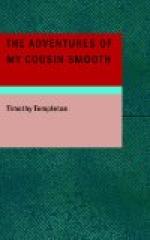“’Ye’ll do for the Young America, that ye will! There’ll be no more old-fogyism—no more of the slow-coach school! Take another bumper, and you’ll be ripe for the new party.’ The General, with less dignity than you might have supposed him capable of condescending to, filled his glass, drew his chair back, threw his square figure well over the arms, and roared right out until it became dangerous. At length he began to drink his whiskey, and that stopped his joy for a time. But he soon broke out afresh. ’What on earth is the matter with you, stranger? you ain’t going to make a shaking machine of your broad sides, be ye?’ says I, giving him a look that would have pierced a stone wall.
“’You must excuse me, Mr. Smooth, but the principles of your party would make anybody laugh; why!—its sprouting members are all growing out of their breeches. Where, in that stretchy imagination the party possesses, can you find a place for the moon, which of necessity must follow in the train of annexation?’ he inquires seriously.
“’Put it? Why, Gineral, you have been stowed away so long, keeping dog-watch over fogyism, that you don’t comprehend how Uncle Sam has been transformed into a go-ahead chap to suit the times. Consul Saunders ’ll bridge the Gulf Stream, and thus unite Cuba and Cape Florida; and, his pockets well lined with letter-writing materials, be first to march over it and proclaim manifest destiny to the natives. As for the moon, George will find a place in the compact for her.’
“‘But, Mr. Smooth,’ says he, ’what in the name of changes be you going to do with so many little kingdoms? A thousand years will scarcely people our present domain! Now, Smooth, I’ll cut out a small job for the Young American party:—let them, just to give a specimen of their principles, step across to Europe and help Louis and Uncle John (I hate John, though) whip Nicholas, and turn vacillating, faithless Austria into a republic, with principle and spirit equal to her position as a nation.’ The General looked serious as he concluded—so far as whipping Austria was concerned we would be only too glad did she for once throw off her cowardice and afford us an opportunity. She had long played at thimblerig with doty old Mr. John Bull, before whose eyes she had placed the spectacles of fantasy, the changes of which the poor old gentleman’s very refined sense and undeniable diplomacy had not permitted him to comprehend. Austria was like the thief who set himself up as umpire to settle between two knaves of his own cloth, and, while he gave advice to both, was securing to himself the very plunder which gave rise to the dispute. Nicholas, John Bull said, was a ruffian of the go-ahead school; but, of the three ruffians, which shall we choose? history may be the teacher! Ruffians, however, may do good at times, in which sense Nicholas was entitled to more consideration than Mister Bull, in his frenzy, was willing to accord. Thus saying, the General and me took another glass, shook hands, and bowed most politely. Again I stretched myself down for the night, as he (promising to call again and have another talk) disappeared out of the window.




